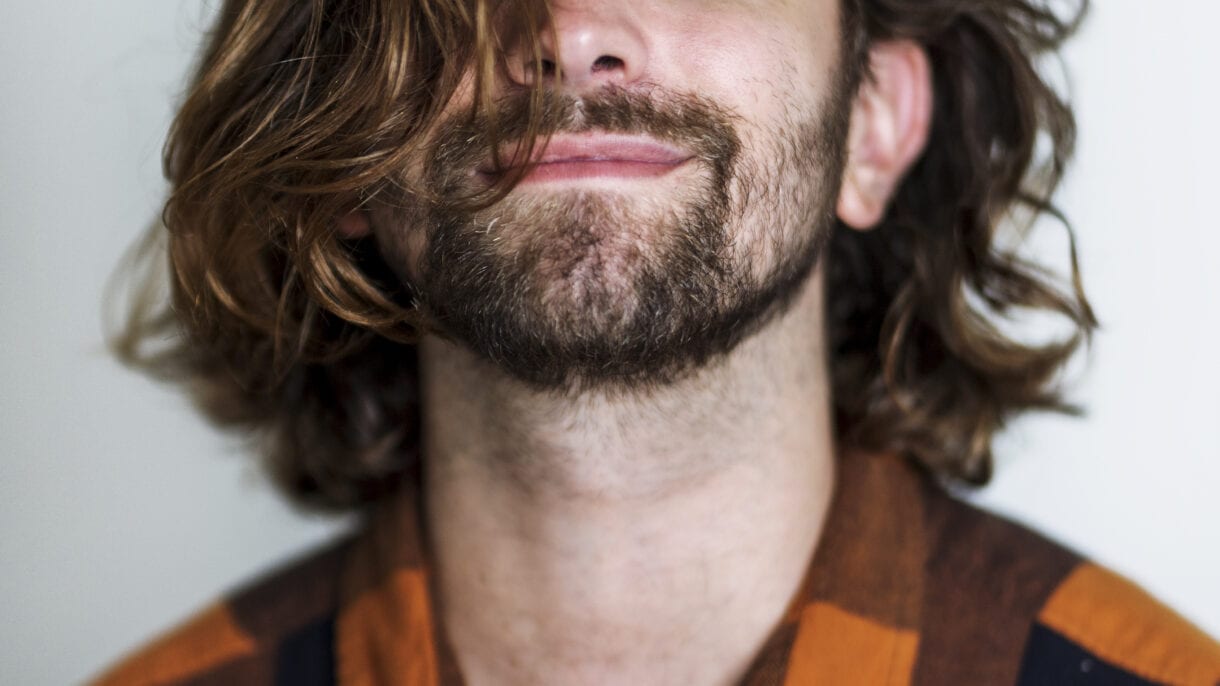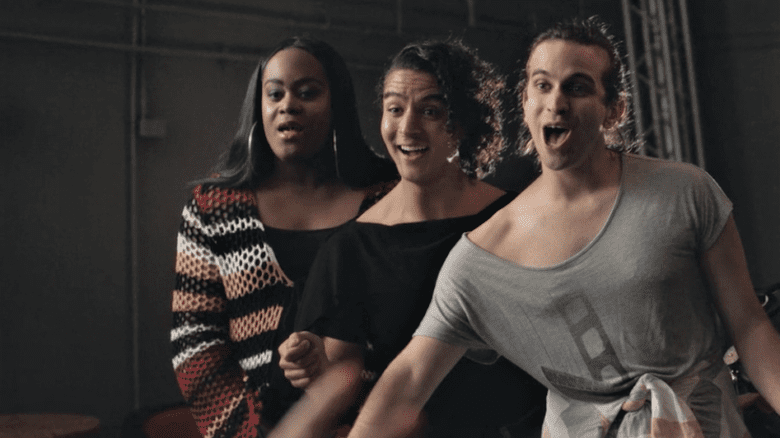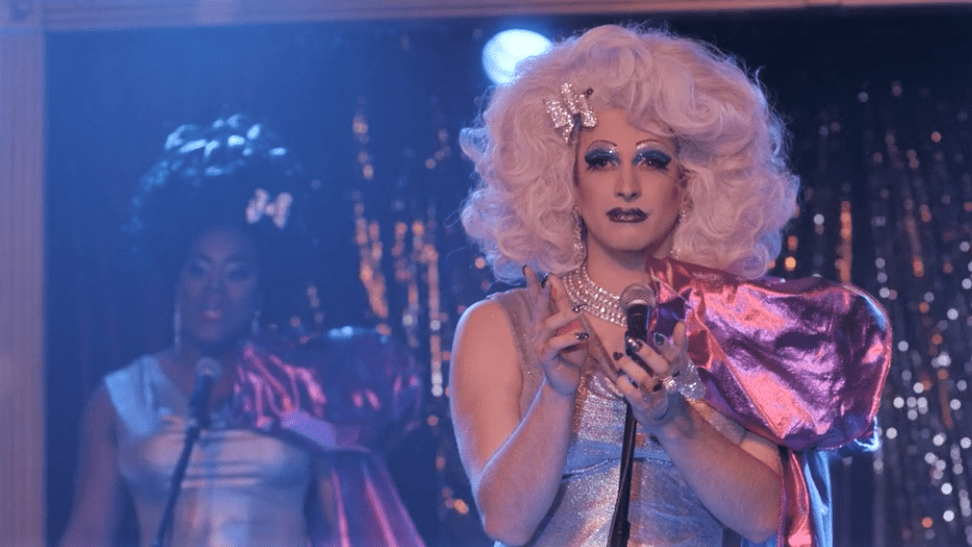If anyone knows how to put the “fun” in funeral, it’s a gaggle of drag queens. That’s exactly what happens in Stage Mother, a new film starring Jacki Weaver and Lucy Liu and directed by gay American-Canadian filmmaker Thom Fitzgerald (The Hanging Garden, Clouburst, Splinters). When a conservative church choir director named Maybelline (Weaver) shows up to her estranged gay son’s funeral, she is confronted by a group of drag queens who bust out a show-stopping lip-sync performance in loving memory of Maybelline’s late son, Rickey. They wow the crowd but Maybelline is repulsed, sneaking out of the church while everyone else dances. But Maybelline has inherited her son’s San Francisco drag club and accidentally becomes den mother to its resident queens, including the coy Joan of Arkansas who is played by Nova Scotia native Allister MacDonald. Together they learn the importance of chosen family and empower each other to move on from the devastating loss of Rickey. Stage Mother is such a feel-good romp of a movie that it almost makes you forget how revolutionary its content is—it’s an unflinching celebration of queerness that doesn’t shy away from exposing some of the dark everyday struggles we face as queer and trans people. And MacDonald’s character, who is both an addict on the road to recovery and a larger-than-life drag songstress, epitomizes that duality. With Stage Mother set to open in select theatres and video on demand across North America on August 21, MacDonald spoke with Xtra about his drag roots, the importance of queer representation and why being in Stage Mother was a full-circle moment for the 29-year-old actor.
You grew up in rural Nova Scotia. Were there any parallels between your experience and the events of the movie?
Allister MacDonald. Credit: Courtesy of Film Mode Entertainment and Momentum Pictures
I grew up in a tiny town called Creignish, in Cape Breton, and it’s literally just mountains, a highway, a church and a massive pro-life billboard. Growing up queer in that area was incredibly isolating and incredibly confusing. So that aspect of the film tapped into something in me that was very personal. I feel like I was able to bring some nice vulnerability to Joan just from that experience. Luckily for me, I have super supportive parents.
Did you do anything else to prepare for the role?
I was thrown in headfirst. I was sent the script about a month before they started filming, and I read it and fell in love with the character of Joan. Drag is a very fun, glamorous, crass, out-there art form. What drew me to Joan was how personal she gets. You kind of get a peek behind the face, behind the costume. So I just thought about how isolated she must have felt in her personal life, and I really just tried to approach her with a soft sense of humanity because I thought it would be an interesting dichotomy to her onstage persona which is very out there, very unabashed. I thought a lot about giving her a shy demeanour in her personal life, as to not play into the stereotypes of what we assume drag queens really are.
Joan’s story gets pretty dark at times, especially when it comes to her struggles with sobriety.
I feel like the trope of the angry queer drug addict is used a lot in mainstream media, so I wanted to take the opportunity to perform that kind of subject matter with as much delicacy as possible. I wanted to honour people who make the choice to become sober. I wanted to honour people who live with mental health issues. I wanted to really approach Joan from a deep emotional place. I know a lot of queer people who have overcome addiction, and I wanted to pay homage to their lives and their stories as truthfully as I could.
What was your relationship with drag before this movie?
I moved to Halifax when I was 18 years old, and I was sneaking into Reflections and Menz & Mollyz Bar, which were the queer spaces back then. I was this tiny little fresh-faced twink, and the drag queen Elle Noir took me in. I was making a living as an underage drag queen in Halifax for a year or two before I decided to become an actor and move to Toronto. So I was immersed completely in the world. She did my face [back then]. And Elle Noir was actually the make-up artist for the film. Coming back all these years later to Halifax and having my drag mother from 10 years before be the makeup artist was so full circle and, to be frank, batshit crazy. She’s in the film, too—she opens the film [along with] another drag queen named Miranda Wrights. It was literally going back to the roots of my performance life.
Do you have any favourite drag performers?
On a mainstream level, I’m a huge fan of Jinkx Monsoon. I tried to put a lot of her into Joan’s performing aesthetic. In Toronto, I really love Priyanka and Tynomi Banks. I’m also a friend of BOA’s. And I’m a huge fan of Sapphire. I’m hoping to see her on the second season of Canada’s Drag Race.
What was it like for you to return to the art of drag in this movie?
It was so cathartic. I love a stage. I don’t know if the producers really expected me to have as much fun and be as alive as I was. The first drag number I shot was the one with the inflatable wig, and they cut a lot of the profane things that I’d done in the initial performance. And one of the numbers—the one with the silver dress and the white wig—is actually a live vocal. It was like living a dream. I got to be a grand dame diva on-screen and also this vulnerable, troubled queer person at the same time. It’s a role I’m so grateful to do as a queer person.
So many of the queer roles in Stage Mother— including yours—are played by queer actors, unlike so many other Hollywood offerings. What do you think having queer and trans-identified actors playing queer and trans characters brings to the movie?
Mya Taylor, Oscar Moreno and Allister MacDonald. Credit: Courtesy of Film Mode Entertainment and Momentum Pictures
We have such a diverse cast. We have Mya Taylor, a trans woman and an incredible actress in the role of Cherry Poppins. We have Oscar Moreno, a Latinx queer actor from Toronto, in a role written for a Latinx queer person. We became a family on set in a way that only queer-identified people could, and it was so amazing to be able to bring that dynamic on-screen in a big Hollywood film because you don’t see that happen very often. GLAAD had a study in 2017, the Studio Responsibility Index, that showed that only 12.8 percent of films that year had LGBTQ2 characters represented on screen. I can only imagine how low the number of queer actors who actually got to be in those roles was. Having a film where three of the main supporting cast members got to represent a chunk of their true existence was so exciting to be a part of. I think it’s time. We got to bring a sense of ease and instant familial chemistry to the dynamic that came from us being queer-identified artists. That is a nuance that I don’t think would come if we had three cis, straight actors in these parts.
What was it like to have drag legend Jackie Beat playing your drag mother?
She’s everything you expect. She is a consummate professional, sarcastic as heck but in a really loving way. We just learned so much from her. She brought her full humanity to her scenes. And she’s a legend! Working with legends is always so special, especially if they’re queer legends.
Why do you think it’s important for people to see this movie right now?
This movie is a story of acceptance. It’s a story of embracing what you might be afraid of. There’s a line in the film where Maybelline is talking to her husband and she says, “I am not going to see our son through your frightened eyes.” That taps into something that the world is going through politically in terms of issues of diversity and race. If one person—if a mother, a son, orsomeone who’s queer-identified—can watch this film and have a slight change or feel just a little bit more accepting or a little bit more accepted then the movie has done its job.
What’s next for you?
I have a film that will be on CBC titled Liar. It is a subversive, dark, queer film about two men who meet on Grindr and go to hook up on the roof of a church. They don’t end up hooking up, and some shit happens that I won’t spoil, but it’s very dark and very witty. I’m so excited for that to come out because it’s also a queer story, but quite a bit darker than Stage Mother and a very different role than Joan.


 Why you can trust Xtra
Why you can trust Xtra


